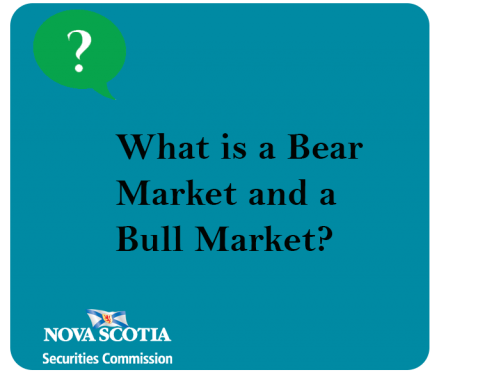Submitted by nsscadmin on

When the media are reporting on the markets you’ll often hear them use the terms Bear Market or Bull Market. If you don’t know what either of those terms means in reference to what the market is doing, it won’t help you as an investor. Let’s clear the air by defining both.
A Bull Market refers to a market that is on the rise. In a Bull Market investors are confident and optimistic that the market’s increases will continue and value and returns will also rise. When talking about a Bull Market most references are to the stock market and equities, but it also applies to other financial markets and securities such as currencies, bonds and commodities.
A Bear Market is the opposite of a Bull Market. In a Bear Market the market’s are on the decline. Prices and value are falling continuously and are expected to continue dropping. This can lead to a drop in investor confidence which can perpetuate the downturn. A Bear Market is often linked to a faltering economy, recession and higher unemployment.
In a Bull Market investors typically become buyers as they try to take advantage of rising prices of securities. A Bear Market is typically a seller’s market as investors try to sell their securities before the Bear Market decreases their value. Eventually the trend reverses as the rise or the fall ends. Bull Markets may be called bubbles when the market is driven higher than the intrinsic value of the assets, such as stocks or house prices.
The terms Bull and Bear market have a few historical explanations behind them. They are thought to have come from the way each animal attacks its prey or enemies. A bull thrusts it horns up, while a bear slashes its claws down. Therefore, a Bull Market goes up, while a Bear Market goes down.
Another possible source of the term Bear Market are the middlemen that sold bearskins that they had not yet received. They were considered to be one of the first short sellers. After promising delivery of bearskins at a certain price the sellers would hope that the market price of the skins would decrease before they took possession from the trappers. These would make their purchase price from the trapper less, earning them more profit from their already agreed upon sale. These middlemen sellers become known as bears and the term came to be known as a person hoping for a decrease in the market.
No matter where the names come from, Bull and Bear Markets are long term shifts in the market that can have great effects on investors and their returns. Even if you hear reports of a Bull or Bear market coming it’s always smart to do your research and get guidance from a registered adviser before taking the bull by the horns.
